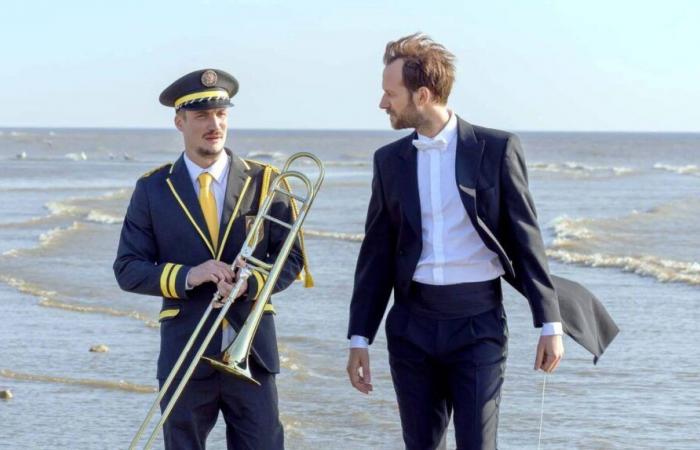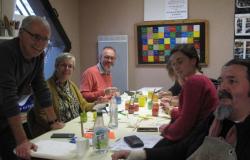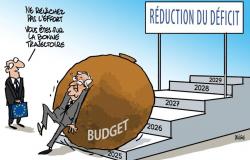You all come from very different artistic backgrounds. What was the process of finding harmony to interpret these two brothers who seem to be opposed to each other?
Pierre Lottin: I'm not sure we're really that different! It's a bit like the Beatles: Paul McCartney came from a modest background and John Lennon from a more affluent background. There, I am the one of ''the street'' and Benjamin the one on the ''more chic'' side.
Benjamin Lavernhe: This diversity is interesting. I have done a lot of theater, including the Comédie-Française, and Pierre has a career marked by popular comedies like ''Les Tuche''. We found ourselves on a common playing field, and that created real richness in our work.
Exactly, Pierre, the comic dosage in this film is very different from that of ''Tuche''. Was this a challenge for you?
P. L.: Not really. Each role requires a particular dosage. In ''Les Tuche'', everything is more exaggerated. Here, we are on a more nuanced register, but it remains comical. I would even say that this role mixes several styles of humor: there is posture, breaks, work on the voice… It allowed me to explore another universe while keeping an element of composition.
You are both great music fans, even musicians. How did your meeting go at this level?
B. L.: We didn't discuss our musical tastes much. But there were notable moments, especially around a piano. Pierre improvises very well, he is self-taught, and that really touched me because I learned the piano in a bit the same way, by ear. During filming, he improvised a concert in a retirement home for free. The residents were over the moon. These kinds of moments show how much music can bring people together.
P. L.: These are moments where everything naturally connects. In the musical scenes of the film, we understood each other, without needing to talk too much.
''A Fanfare'' also deals with social and cultural differences. How did you approach these themes?
B. L.: My character, Thibaut, wants to “save” his brother Jimmy. Yes, but, ultimately, save him from what, exactly? It's interesting because this attitude reveals his own certainties, his guilt for having had a better life than him. As a result, he wants to make up for it and give Jimmy the chance he didn't get. Not making Thibaut unsympathetic was a real challenge. We didn't want him to appear condescending or paternalistic towards his brother. He is sometimes wrong in his intentions, but that's what makes him human. He is driven by the sincere desire to see his brother fully exploit his talent.
P. L.: At first there is a hint of jealousy between them, but it doesn't go too far. Jimmy quickly agrees to make this donation which can save Thibaut from leukemia. He has no hard feelings. A complementarity quickly arises between them: what one leaves unfinished, the other tries to fill.
How did you collaborate with the amateur actors who play in the marching band?
B. L.: At first, I was a little apprehensive because they had never acted in a film. But they were very natural, even on long days of filming. And off camera, they were incredibly warm.
P. L.: We quickly felt that they were authentic. Their presence nourished the film.
Benjamin Lavernhe, your career choices demonstrate a taste for popular auteur cinema. Is this your main selection criterion when you receive a project?
B. L.: Theater and cinema must remain popular arts. Many people think that classical theater, for example, is inaccessible, but this is not true. Molière, to name just one, wrote plays that are aimed at everyone. We simply have to break these complexes and make the works accessible without simplifying them. The objective is to reach a wide audience without falling into formatting or consensual content. ''En fanfare'' reflects this philosophy well. It is, in fact, a demanding but sincere work, in which it is easy to recognize oneself.
Our review
History
Here, Thibaut, good-natured conductor (Benjamin Lavernhe). And there, Jimmy, a hard-pressed worker from the North (Pierre Lottin, alias Wilfried Tuche in “Les Tuche”). Both were adopted – one by proles, the other by bourgeois – but are unaware of their reciprocal existence. Suffering from leukemia, Thibaut needs a bone marrow transplant and, thanks to a DNA test with his sister in the hope of a donation, he discovers that his mother is not his mother and that he has a biological brother who plays the trombone in a marching band…
Our opinion
After “A triumph”, in which Kad Merad plays a struggling actor who rediscovers the taste for life among inmates, Emmanuel Courcol (Philippe Lioret's regular screenwriter “Welcome” and Édouard Bergeon “In the name of the earth”) takes us on a new human adventure full of emotions. We think of “Life is a long, quiet river” when the brothers' two worlds collide. Everything seems written in advance – clash of cultures and social determinism – in this sensitive comedy… However, the fiction carries its spectator into laughter and tears. And it's not really a coincidence that Robert Guédiguian co-produced the film, as we perceive his well-crafted popular touch.
> By Emmanuel Courcol (France). With Benjamin Lavernhe, Pierre Lottin, Sarah Suco…
Comedy. 1:43 a.m.






